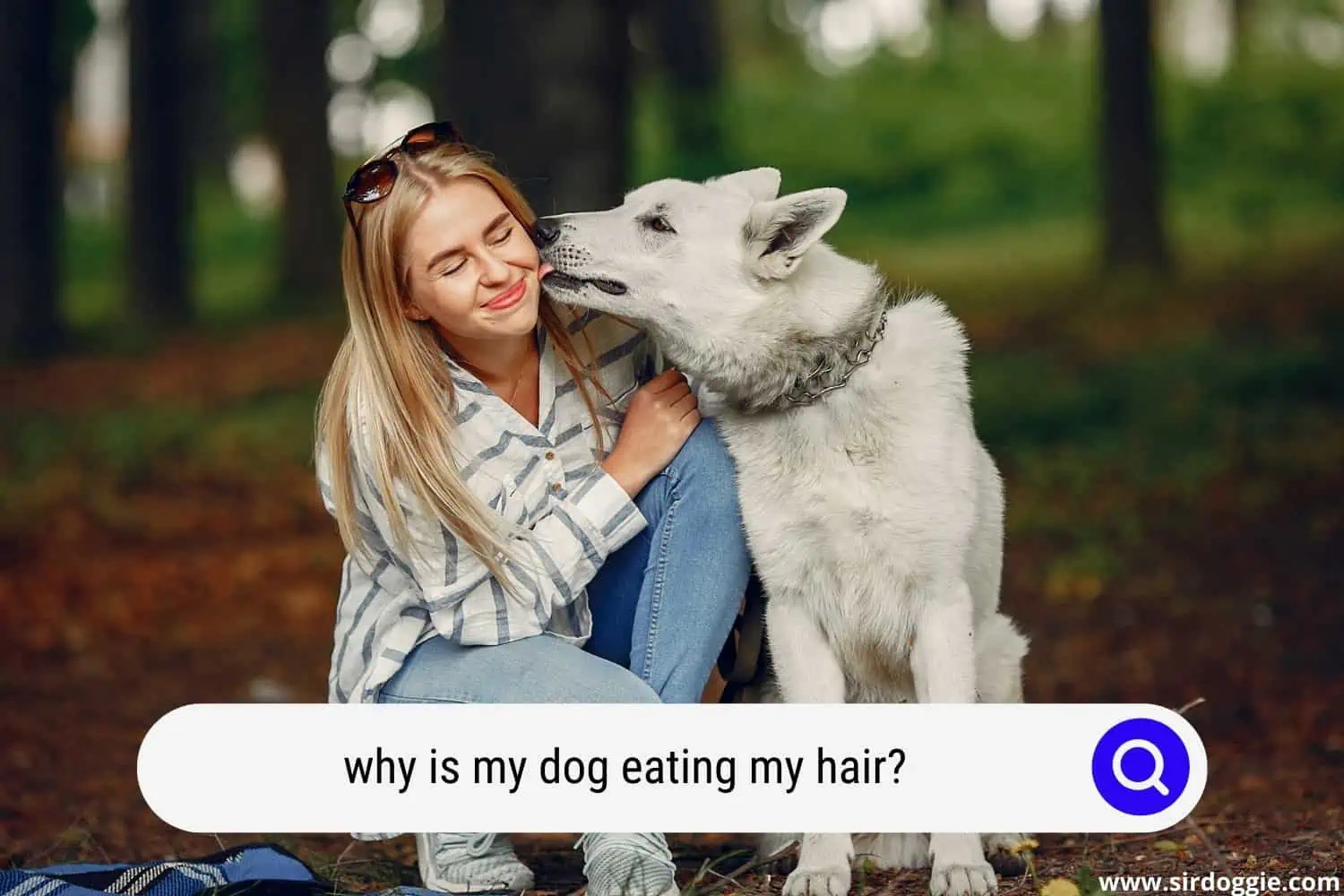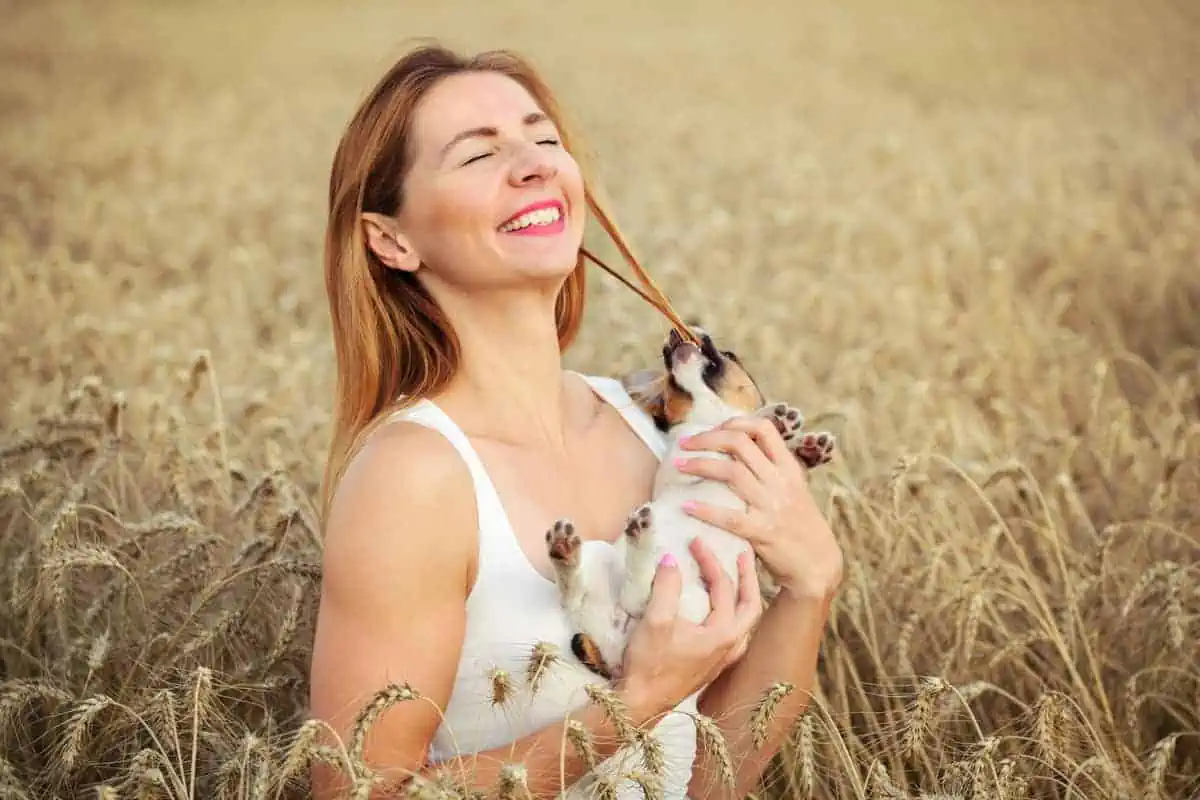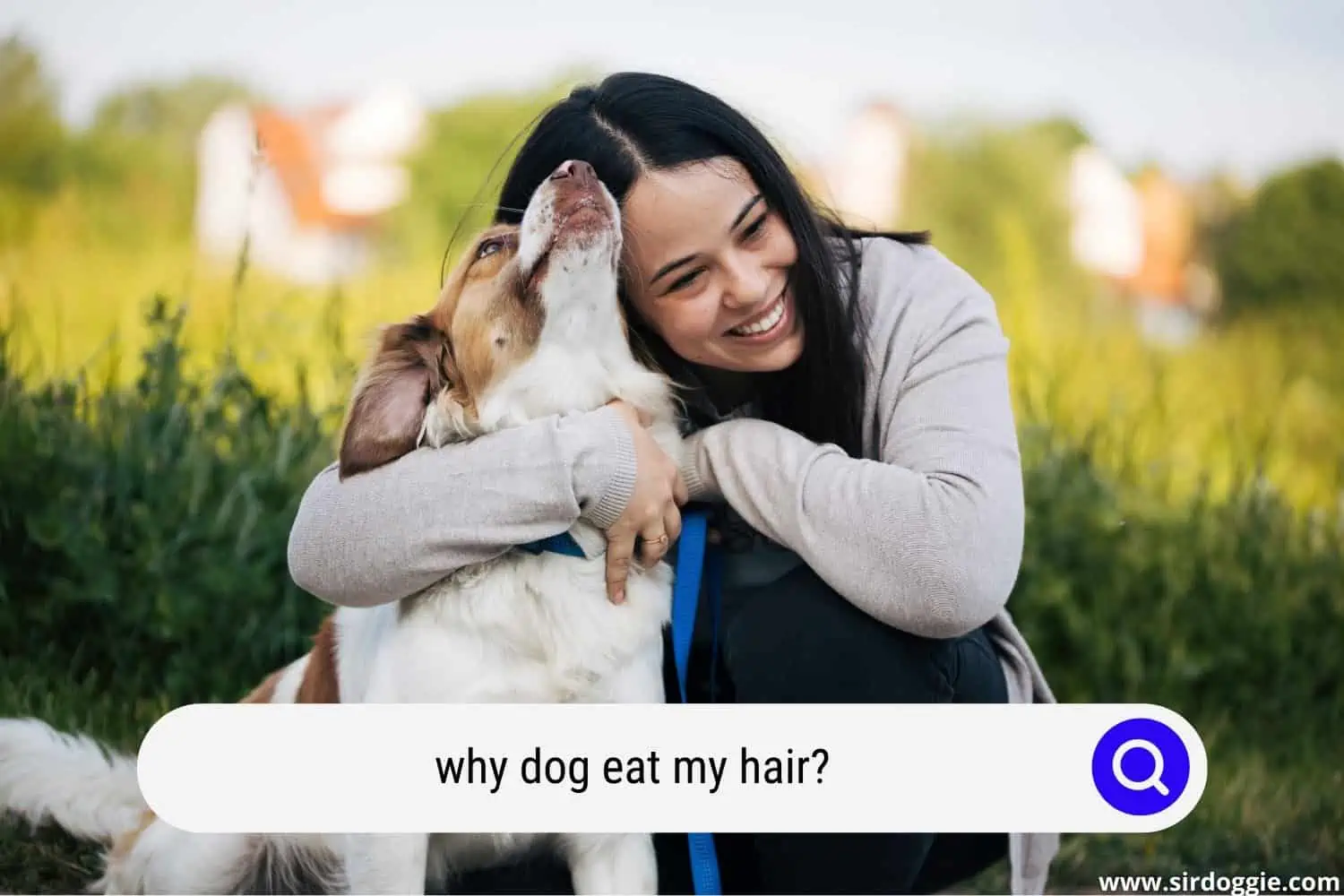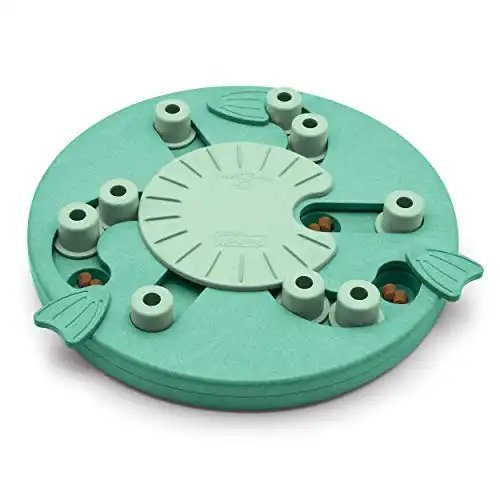Why Is My Dog Eating My Hair? Mystery EXPLAINED!
So you may be wondering, why does my dog eat my hair? Attention-seeking, boredom, and stress can be reasons for a dog eating human hair. It could also be a health condition known as Pica. Ensuring adequate and/or increased exercise time and stimulation are provided can help stop this behaviour, and a visit to the veterinarian might be necessary if you’re worried it’s medically related.

Dogs have a myriad of behaviours all of which are used to communicate to their owner or other furry friends their needs — to play, to eat, to sleep, etc.
While dog owners adore and sometimes marvel at their strange behaviours like hair chewing, it’s important to know when the behaviour goes from being cute to concerning.
On the other hand, conditions like Pica, parasites, and allergies may require the expert advice and treatment of a veterinarian. Excessive hair eating can lead to dangerous and potentially life-threatening health issues.
Some of the links in this post are affiliate, and we may earn a commission.
Seeing scabs, sores, redness, excessive scratching, and chewing can be telltale signs a trip to the veterinarian is needed. Taking note of the physical well-being as well as behavioural indicators could save your pet’s life.
These tips and tricks in this post can help keep your sweet puppy happy and healthy. Keeping an open and keen eye to weird behaviour like hair chewing could save your pup.
Dogs can have some strange behaviour, most of which is lovable and quite adorable, but are they trying to tell us something?
We’ve heard all sorts of questions from concerned pet parents, like why does my dog eat goose poop? Or pet parents wondering why their dog follows them and no one else.
As many pet parents find themselves scratching their heads at the odd head tilts, jumps, barks, and waggle of tails, some find themselves puzzled by their dog’s appetite for hair.
Yes, that’s right, hair. Those beautiful luscious locks could become a new chew toy for a number of different reasons all of which will be explored.
Boredom, Anxiety, and Attention Seeking
Dogs need adequate play and exercise time and without it, they may begin to develop certain unsavoury behaviours, such as hair chewing, according to various sources. Boredom can even lead to the dog removing its own hair or going on the hunt for human hair to eat.
Simply going on longer walks, and spending extended time at dog parks with numerous avenues of mental and physical stimulation could put a damper on this odd behaviour. As children, it’s best to let them tucker themselves out.
Keeping the idea of boredom in mind, dogs may just be seeking their owner’s attention by nuzzling close and chewing on hair. Let’s be honest, it can be cute when they whine and beg for attention especially when they snuggle close and insist on giving them a good belly rub, or outright laying on you.
Long hair and even long beards could be prey to playful puppy chewing or pulling for an entertaining game of tug of war.
But even attention-seeking behaviour can slide into naughty acts like scratching at the floor, barking, or other unsavoury acts. Whether the reaction is positive or negative, they learn that behaviour will be rewarded by personal attention and may continue to do so.
This may be where a trainer is needed to correct this behaviour if the pet parent cannot modify the behaviour on their own.
Furthermore, hair chewing could also be a sign of stress or anxiety. As mentioned previously, as young pups they could be experiencing separation anxiety from their litter.
However, separation anxiety can also crossover to their owners in a way of fearing their absence. Similar to the way humans can develop nervous ticks that present themselves when they are nervous or anxious, dogs can share those behavioural traits.

Health Conditions
While the reasons listed so far may need some minor behaviour modifications, they don’t necessarily warrant a trip to the vet. However, the behaviour should be monitored for if it persists there may be some underlying health conditions that need to be addressed by a veterinarian or a trainer.
Pica is a condition that can both affect humans and animals. The condition is characterized as an “irresistible urge to eat things that aren’t food, which may include your hair, their own hair, or the hair of your other pets (Puppy Smarts)”
As noted in Diana Bocco’s article from PetMd.com, Dr. Kelly Black from Cedar Valley College says that items containing the owner’s scent can be a particular favourite. This compulsive behaviour can severely endanger a dog’s health as some items may be toxic.
While identifying the condition may not be difficult, discovering what exactly is causing the behaviour or condition may be tricky. There are a variety of causes such as nutritional and hormonal imbalances, and diabetes that could be the culprit according to sources.
It is advised that dogs suspected of this condition be taken to their veterinarian for diagnosis and treatment.
Fleas, Ticks or Parasites
Fleas, ticks or parasites could also be the cause for incessant hair chewing. Indicators that it could be a parasite include obsessive chewing off and eating their own fur.
They could develop scabs, sores, or redness from scratching and chewing.
Not to mention the effects that fleas, ticks, and parasites can have on humans, identifying this problem is vital for the household to remain a healthy space for pets and their family companions.
Allergies
Lastly, there could be an environmental cause or an allergy. Puppy Smarts explains, “You may notice him chewing, licking, and eating his hair due to itching.
Much like our first reaction to a skin allergy is to scratch it, it’s the same thing for your dog.” Similar to humans, allergies can be just as irritating to dogs and they can even share the same irritant.
Pollen, grass, mold, or food can cause familiar symptoms like watery eyes, sneezing, paw licking, or patchy skin.
In all these cases of dogs eating human hair, the question remains, what happens after they eat it and will they be okay? The short answer is yes, those lovable little creatures will be just fine.
The hair will pass through their digestive system without consequence as long as they don’t eat a large quantity. However, if this behaviour is a regular habit, dogs can experience constipation or even hairballs.
Hair may pass from the dog’s rear end and allow it to pass on its own. Do not pull it out as this could cause internal damage.
New Discoveries
Like children, puppies find interest in many things and resort to putting such new discoveries in their mouths. Hair can be an intriguing new toy to explore —it’s shiny, it smells good, and it wiggles and shakes.
Simply put, hair chewing can be normal behaviour for growing and developing puppies. This is their way of exploring new things that they come in contact with, by smelling, licking and chewing.
Sources say that in young puppies, hair chewing could be a temporary side effect or a result of separation anxiety from leaving their mother. Time could be the only remedy for this odd habit — allowing young puppies to get acclimated to their new home and owner.
Otherwise, seeking the advice of a trainer would help to not only socialize the young newcomer but also learn new skills and keep them engaged.
In terms of behavior though, hair chewing may be something to notice.

Conclusion
While it’s important to keep an eye on this behaviour, it’s best to also know when to take that furry friend of yours to the vet. Noticing the symptoms associated with Pica, or seeing fleas and ticks are obvious indicators to seek professional treatment, but there are other signs to keep a note of.
As previously discussed, constipation may be a normal side effect of hair consumption, but constipation lasting longer than forty-eight hours is a cause for concern.
If the dog in question cannot have a bowel movement, there may be hairballs in their intestinal tract which can be life-threatening. Furthermore, if the human hair is coasted in any products or treatments, which most people use, dogs could experience toxicity issues and become ill.

Family Dog Expert Author
Hi there! I’m Stuart, a devoted dog lover and family dog expert with over a decade of experience working with our furry companions. My passion for dogs drives me to share my knowledge and expertise, helping families build strong, loving bonds with their four-legged friends. When I’m not writing for SirDoggie, you’ll find me hiking, playing with my beautiful dog, or studying music.
